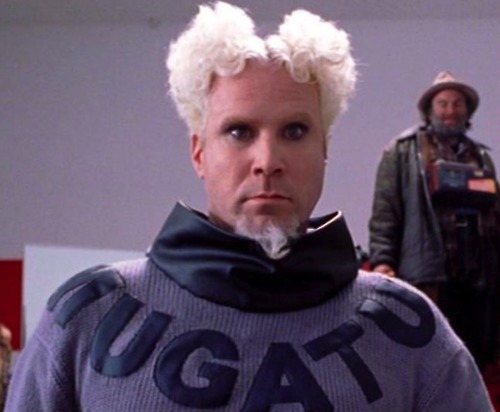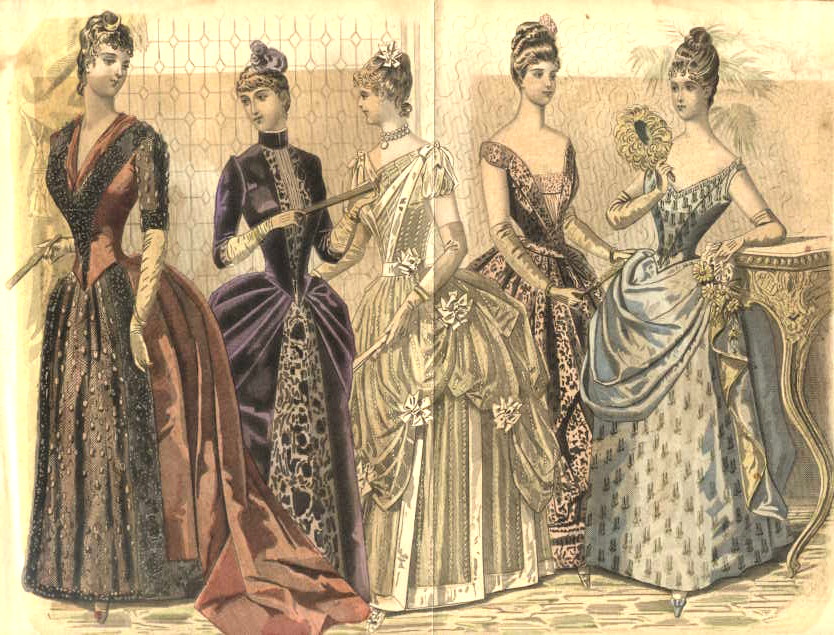The scene depicted above is Derek Zoolander and Hansel McDonald literally competing on the catwalk. Derek gets out shown by the "new comer" Hansel and Matilda, a reporter, writes critical articles about Derek . They are so obsessed with looking better than the other that they become engulfed and infatuated with looking the best and forget who they are.
 |
| Mugatu |
Matilda and Zoolander find out about Mugatu's plan and search for refuge and Hansel's house, knowing that Mugatu would never look there (considering Zoolander and Hansel really don't like eachother - even though they don't know each other). This is when Zoolander and Hansel actually get to know each other and find out that they had no reason to hate each other all along and Hansel ends up basically saving Zoolander when Mugatu sends him the signal to kill the Prime Minister.
 The realization that Zoolander and Hansel came to is a similar realization to the one that I came to
The realization that Zoolander and Hansel came to is a similar realization to the one that I came to at the end of senior year in high school. Because I chose to look at the way others and I dressed as a competition, it was hard for me to get close to people and I didn't really know them. If they were better dressed than me, I would already not like them, even if I didn't know their name, which was wrong of me. I worried about my own and others fashion and appearance over what would be the ethical thing to do in this situation - which would have to to not judge people prematurely and get to know people before I judged them.
Using fashion and appearance to judge people is nothing, even close, to a new concept: does that make it ethical?

During the 18th century, men and women dressed for occasions, but had only few outfits. They way men and women dressed distinguished people by classes, but overall comfort and modesty were the ultimate goals. The rich has lavish, beautiful clothing while the poor were in dingy clothing.
 Continually, during the 19th century, after the French Revolution, clothing was more for fashion than for comfort. The invention of the sewing machine helped to mass produce clothing in a variety of designs which also made more, of what used to be upper class, clothing affordable to the common person. Fashion was used to enhance looks. Women's skirts became bigger and less "wearer-friendly"; big skirts would be worn for work and in the hot summer months which was not comfortable or practical (and don't ignore the corsets that were worn which were usually made with whale bone). Men also went from wearing short pants to long pants all year long which was obviously also not practical.
Continually, during the 19th century, after the French Revolution, clothing was more for fashion than for comfort. The invention of the sewing machine helped to mass produce clothing in a variety of designs which also made more, of what used to be upper class, clothing affordable to the common person. Fashion was used to enhance looks. Women's skirts became bigger and less "wearer-friendly"; big skirts would be worn for work and in the hot summer months which was not comfortable or practical (and don't ignore the corsets that were worn which were usually made with whale bone). Men also went from wearing short pants to long pants all year long which was obviously also not practical.The difference between the 18th and 19th centuries, fashion wise, was in part because of the French Revolution. During the 18th century, the poor were oppressed and dominated by the rich through clothing, but free in their clothing. The 19th century brought the fashion that the poor wanted, liberating them in that sense, but were now constrained by their clothing. During the 18th century clothing was used to oppress the poor, but they were liberated by their fashion, they were comfortable and modest. The 19th century was the complete opposite, the poor were liberated by being able to choose what to wear and not being oppressed by the rich, but everyone was being oppressed and constrained by their clothing; as Lauren Ashwell and Rae Langton would say, they became "slaves to fashion".
During the 18th century, the rich were only worried about the aesthetics. They were not worried about the fact that they were oppressing the poor, ethics were not their first priority; the rich were lacking openness to change. The change between the 18th and 19th centuries showed the ethical reasons why the poor wanted to be seen as equals; universalism. The 19th century brought that universalism, but ended in everyone forgetting the ethics of dress. People were physically hurting themselves in order to look nice: whale bone corsets are the perfect example. The differences between the ethical and the aesthetic were clearly not reconciled.
Since I have stopped treating everyday dress as a competition, similar to Zoolander, Hansel, Mugatu and the 18th century wealthy, I would argue that I have balanced the ethical and aesthetic in a way that I can walk around with my head up and see myself as an ethical human being while still having self confidence. From the values listed on the Schwartz Value Inventory, the top two values that I have are self-direction and universalism. I want to be able to control myself and, in the realm of fashion, chose what I want to wear based off of how I feel and my own thoughts, but I also believe that all people should be considered and included. Both the ethical and the aesthetic should be considered in everyday life, but I would argue that there can never be a perfect balance of both; we're humans, we're not perfect.

No comments:
Post a Comment